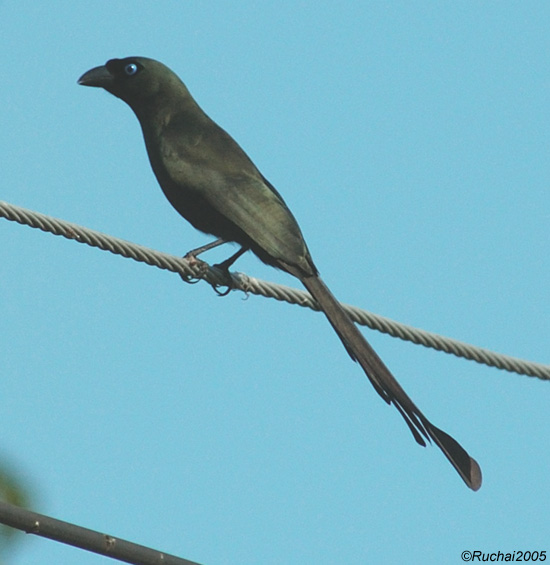m |
(→External Links: Multiple GSearches combined) |
||
| (3 intermediate revisions by 2 users not shown) | |||
| Line 1: | Line 1: | ||
| − | [[Image:Racket-tailed_Treepie.jpg|thumb|550px|right|Photo by ruchai <br/ > | + | [[Image:Racket-tailed_Treepie.jpg|thumb|550px|right|Photo by {{user|ruchai|ruchai}} <br/ >Sriracha, [[Thailand]], November 2003]] |
| + | '''Alternative names: Black Racquet-tailed Treepie; Black Treepie; Bronzed Treepie''' | ||
;[[: Category:Crypsirina|Crypsirina]] temia | ;[[: Category:Crypsirina|Crypsirina]] temia | ||
==Identification== | ==Identification== | ||
| − | + | 31 - 33cm. A small, all-dark treepie: | |
| + | * Black forehead of short, plush black feathers | ||
| + | * Rest of plumage blaksih with bronze-green sheen (contrasting in good light with black of face and throat) | ||
| + | * Long tail, broadening at the end, blackish with greenish tinge | ||
| + | * Turquoise-blue iris, darkening towards the pupil to a deep black | ||
| + | * Black bill and feet | ||
| + | Sexes are similar. Juveniles have a brown iris and are dull greyish-black overall. | ||
==Distribution== | ==Distribution== | ||
| − | + | Found in southern [[Myanmar]] to northern [[Malaya]], [[Indochina]], [[Java]] and [[Bali]]<br /> | |
| + | Extirpated in extreme northwest peninsular [[Malaysia]]. An old specimen from [[Sumatra]] and two from [[Borneo]] are today regarded as erroneous. <br /> | ||
| + | Not uncommon in most of its range. | ||
==Taxonomy== | ==Taxonomy== | ||
This is a monotypic species. | This is a monotypic species. | ||
==Habitat== | ==Habitat== | ||
| − | Scrub and secondary growth, open fields and gardens, bamboo thickets and open forest | + | Scrub and secondary growth, open fields and gardens, bamboo thickets and open forest up to 1000m. |
==Behaviour== | ==Behaviour== | ||
| − | It is an arboreal feeder. Its tail is used as a balancing organ. It eats mainly insects and fruit. | + | It is an arboreal feeder. Its tail is used as a balancing organ. It eats mainly insects and fruit.<br /> |
| + | Breeding reported from April to August. Its nest is cup shaped and is built in bamboo or shrubs especially thorny ones often surrounded by open grassy areas. It normally lays 2–4 eggs.<br /> | ||
| + | The voice is usually described as harsh.<br /> | ||
| + | Resident as far as know. | ||
| + | ==References== | ||
| + | #{{Ref-Clements6thAug21}}#{{Ref-HBWVol14}} | ||
| + | {{Ref}} | ||
| + | ==External Links== | ||
| + | {{GSearch|"Crypsirina temia" {{!}} "Racket-tailed Treepie" {{!}} "Black Racquet-tailed Treepie" {{!}} "Black Treepie" {{!}} "Bronzed Treepie"}} | ||
| + | {{GS-checked}}1 | ||
| + | <br /> | ||
| + | <br /> | ||
| − | |||
| − | |||
| − | |||
| − | |||
| − | |||
[[Category:Birds]][[category:Crypsirina]] | [[Category:Birds]][[category:Crypsirina]] | ||
Latest revision as of 19:04, 22 August 2023
Alternative names: Black Racquet-tailed Treepie; Black Treepie; Bronzed Treepie
- Crypsirina temia
Identification
31 - 33cm. A small, all-dark treepie:
- Black forehead of short, plush black feathers
- Rest of plumage blaksih with bronze-green sheen (contrasting in good light with black of face and throat)
- Long tail, broadening at the end, blackish with greenish tinge
- Turquoise-blue iris, darkening towards the pupil to a deep black
- Black bill and feet
Sexes are similar. Juveniles have a brown iris and are dull greyish-black overall.
Distribution
Found in southern Myanmar to northern Malaya, Indochina, Java and Bali
Extirpated in extreme northwest peninsular Malaysia. An old specimen from Sumatra and two from Borneo are today regarded as erroneous.
Not uncommon in most of its range.
Taxonomy
This is a monotypic species.
Habitat
Scrub and secondary growth, open fields and gardens, bamboo thickets and open forest up to 1000m.
Behaviour
It is an arboreal feeder. Its tail is used as a balancing organ. It eats mainly insects and fruit.
Breeding reported from April to August. Its nest is cup shaped and is built in bamboo or shrubs especially thorny ones often surrounded by open grassy areas. It normally lays 2–4 eggs.
The voice is usually described as harsh.
Resident as far as know.
References
- Clements, J. F., T. S. Schulenberg, M. J. Iliff, S. M. Billerman, T. A. Fredericks, J. A. Gerbracht, D. Lepage, B. L. Sullivan, and C. L. Wood. 2021. The eBird/Clements checklist of Birds of the World: v2021. Downloaded from https://www.birds.cornell.edu/clementschecklist/download/
- Del Hoyo, J, A Elliott, and D Christie, eds. 2009. Handbook of the Birds of the World. Volume 14: Bush-shrikes to Old World Sparrows. Barcelona: Lynx Edicions. ISBN 978-8496553507
Recommended Citation
- BirdForum Opus contributors. (2024) Racket-tailed Treepie. In: BirdForum, the forum for wild birds and birding. Retrieved 7 June 2024 from https://www.birdforum.net/opus/Racket-tailed_Treepie
External Links
GSearch checked for 2020 platform.1




